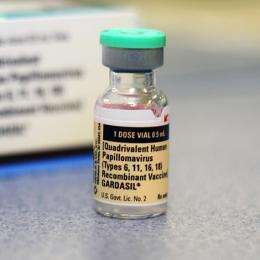HPV immunization program cuts pre-cancer rates by more than half

A school-based human papillomavirus (HPV) immunization program in British Columbia, Canada, is dramatically reducing rates of cervical pre-cancer in B.C. women, according to a new study.
The evaluation of the HPV vaccination program in B.C. was conducted jointly by researchers at BC Cancer, the BC Centre for Disease Control, BC Women’s Hospital + Health Centre and the University of British Columbia and highlights the success of the program in reducing pre-cancers. Pre-cancer refers to abnormal cell growth in the cervix most often discovered during routine Pap tests. If not treated, pre-cancer can develop into cervical cancer.
The study found that B.C. women who had received the HPV vaccine as Grade 6 girls had a 57 per cent reduction in the incidence of cervical pre-cancer cells compared to unvaccinated women.
“We are excited by these initial findings,” said Dr. Gina Ogilvie, senior research advisor, BC Women’s Hospital + Health Centre and professor at the UBC school of population and public health. “This study contributes to the growing body of evidence highlighting the positive impact of the HPV vaccine and regular cervical screening on preventing cervical cancer. And, with increased vaccine uptake, we would expect to see a further decrease in cervical cancer rates.”
HPV has been identified as the cause of almost all cervical cancers. In 2008, B.C. implemented a voluntary publicly funded school-based HPV immunization program. Eleven years later, the first groups of women vaccinated through this program have reached adulthood and entered the Cervix Screening Program. By linking records from the provincial Cervix Screening Program with immunization registries, researchers were able to compare outcomes between the women who had received vaccinations to those who had not.
Women included in the study received the quadrivalent vaccine, which protects against two types of HPV responsible for approximately 70 per cent of all cervical cancers. The HPV vaccine that is now administered in the school-based program protects against seven types of the virus that cause about 90 per cent of cervical cancers. As today’s Grade 6 girls receive a more comprehensive vaccine, rates of pre-cancer are expected to decline even further in coming years.
HPV is common in both men and women and can be easily spread through sexual contact. Most people will contract HPV at some point in their lives, and it is important to get vaccinated before becoming sexually active. The vaccine is now available for free to both girls and boys in Grade 6 and protects against cervical, anal and some rare penile cancers.
Although most HPV infections clear up on their own, some cause pre-cancerous lesions that can develop into cancer over time if not treated. It can take more than 10 years for pre-cancerous cells to develop into cervical cancer. Regular cervical cancer screening is important to identify abnormal or pre-cancerous cells, before they cause symptoms.
Source: Read Full Article



